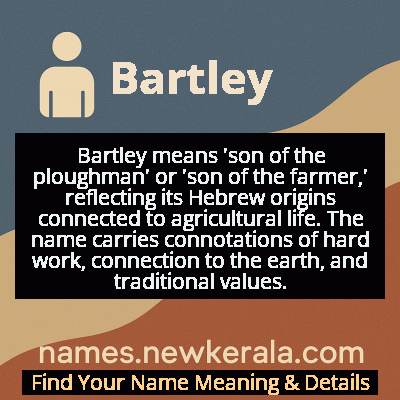Bartley Name Meaning & Details
Origin, Popularity, Numerology Analysis & Name Meaning of Bartley
Discover the origin, meaning, and cultural significance of the name BARTLEY. Delve into its historical roots and explore the lasting impact it has had on communities and traditions.
Name
Bartley
Gender
Male
Origin
Hebrew
Lucky Number
2
Meaning of the Name - Bartley
Bartley means 'son of the ploughman' or 'son of the farmer,' reflecting its Hebrew origins connected to agricultural life. The name carries connotations of hard work, connection to the earth, and traditional values.
Bartley - Complete Numerology Analysis
Your Numerology Number
Based on Pythagorean Numerology System
Ruling Planet
Moon
Positive Nature
Diplomatic, friendly, artistic, empathetic.
Negative Traits
Over-sensitive, moody, indecisive, prone to self-pity.
Lucky Colours
Green, cream, white.
Lucky Days
Monday.
Lucky Stones
Pearl, moonstone.
Harmony Numbers
1, 3, 4.
Best Suited Professions
Diplomats, mediators, caregivers, artists.
What People Like About You
Cooperative spirit, friendliness, artistic talent.
Famous People Named Bartley
Bartley Gorman
Boxer
Undefeated bare-knuckle boxing champion known as the 'King of the Gypsies'
Bartley O'Brien
Irish Republican
Prominent figure in the Irish War of Independence and anti-Treaty IRA
Bartley Green
Religious Leader
Roman Catholic Bishop of Birmingham known for extensive community work
Bartley Cavanaugh
Baseball Player
Professional baseball player for the St. Louis Browns in the 1880s
Name Variations & International Equivalents
Click on blue names to explore their detailed meanings. Gray names with will be available soon.
Cultural & Historical Significance
Extended Personality Analysis
Individuals named Bartley are typically perceived as grounded, reliable, and hardworking, reflecting the name's agricultural origins. They often possess a strong sense of duty and practical wisdom, approaching life with the same methodical care that a farmer tends to his fields. Bartleys are usually patient and persistent, understanding that meaningful results often require sustained effort over time rather than quick fixes. Their connection to the earth metaphorically translates to being down-to-earth individuals who value authenticity over pretense. These personalities tend to be loyal friends and family members, building relationships as carefully as they would cultivate crops. While they may not seek the spotlight, Bartleys often become pillars of their communities, providing stability and wisdom during challenging times. Their practical nature is balanced by a deep appreciation for tradition and history, making them excellent preservers of cultural knowledge and family heritage. The name suggests someone who builds lasting foundations rather than seeking temporary achievements.
Modern Usage & Popularity
In contemporary times, Bartley has maintained a steady but modest presence, particularly in Ireland and among Irish diaspora communities. While it never reached the peak popularity of more common names, it has experienced periodic revivals as parents seek traditional names with strong cultural roots. The name is currently considered somewhat vintage and is often chosen by parents looking for a name that stands out without being overly unusual. In recent years, there's been a slight uptick in usage as part of the broader trend toward reviving old-fashioned names with character. Bartley remains more common in rural areas and traditional communities, though urban parents seeking connection to their heritage have also embraced it. The name's agricultural connotations have taken on new relevance in the context of environmental awareness and sustainable living movements, giving it contemporary resonance beyond its traditional associations.
Symbolic & Spiritual Meanings
Symbolically, Bartley represents fertility, growth, and the cycle of life through its connection to farming and cultivation. The ploughman imagery evokes themes of preparation, foundation-building, and the patient nurturing required for long-term success. This name carries the metaphor of sowing and reaping, suggesting that effort and care invested in relationships, projects, or personal development will yield meaningful returns. The earth connection symbolizes grounding, stability, and connection to one's roots and heritage. Bartley also represents the dignity of honest labor and the wisdom that comes from working in harmony with natural cycles. In a broader sense, the name embodies the concept of stewardship – caring for what has been entrusted to you, whether land, family, or community. The symbolic plough cuts through resistance to prepare for new growth, making Bartley a name associated with breakthrough and transformation through persistent effort rather than sudden change.

